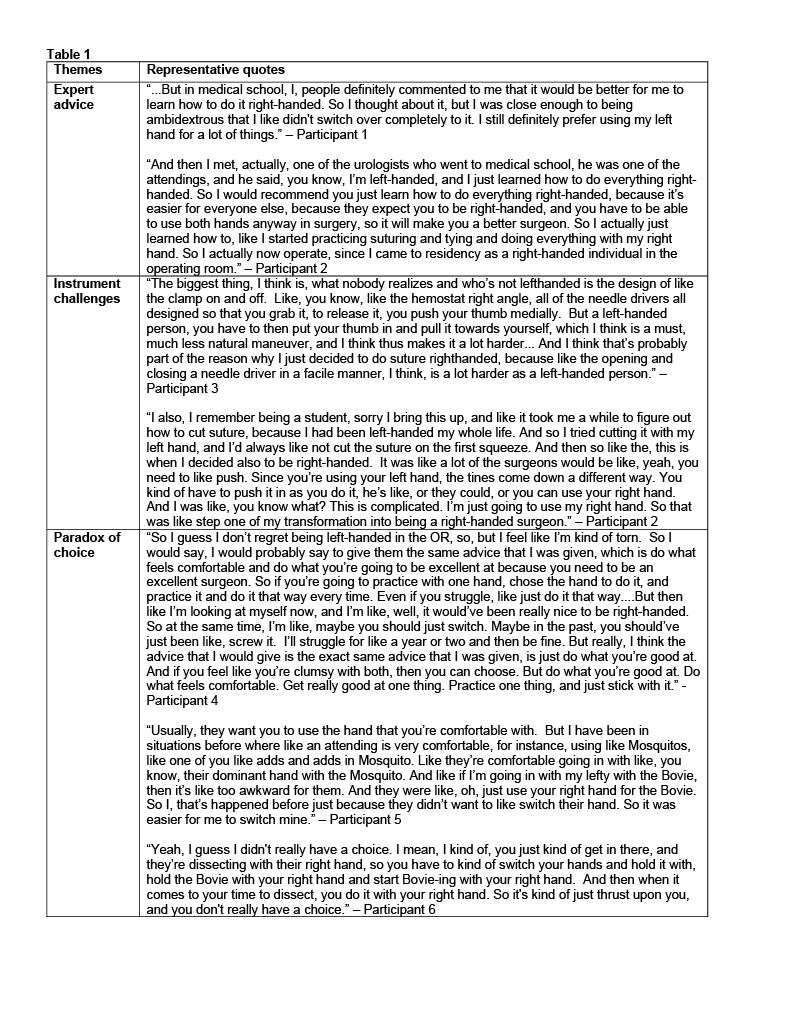Back
Poster, Podium & Video Sessions
Moderated Poster
MP19: Education Research II
MP19-13: Hand Dominance Decision-making and Operating Room Challenges Experienced by Left-Handed Urology Trainees
Saturday, May 14, 2022
7:00 AM – 8:15 AM
Location: Room 228
Christopher Tam*, Maia Anderson, Mary Byrnes, Julian Wan, Bryan Sack, Ann Arbor, MI
- CT
Poster Presenter(s)
Introduction: Left-handed (LH) surgical trainees face unique challenges operating in a right-handed (RH) environment. This qualitative study aims to identify themes related to the operative difficulties encountered by LH urology trainees.
Methods: We conducted semi-structured interviews with LH trainees from surgical specialties at academic programs in the United States. The 6 urology trainee de-identified interview transcripts were analyzed iteratively, informed by interpretive description using MaxQDA20 software.
Results: Participants included 4 residents and 2 fellows from 5 urology programs. Three main themes emerged pertaining to decisions about operative hand dominance: expert advice, instrument challenges, and paradox of choice (Table 1). In expert advice, advice received from attendings during early phases of training, especially medical school, were critical determinants of their operative hand dominance. Advice received fell into two main categories: 1) recommendations to learn to operate right-handed from both right and left-handed surgeons, 2) advice about the importance of confidently choosing and maintaining a dominant operative hand through training. In instrument challenges, mechanical difficulties using RH instruments with their left-hand, especially needle drivers and suture scissors, influenced their decision to operate predominantly RH. In paradox of choice, trainees reported being encouraged to make their own choice about which hand to operate with, however, trainees also described feeling obligated to operate with their right-hand to accommodate their predominantly RH attendings. While trainees generally reported feeling like they made the correct decision, most described contemplating switching their operative hand dominance at some point during their career.
Conclusions: Left-handed urology trainees report challenges with choosing hand dominance in the operating room secondary to use of RH instruments, receiving conflicting advice from surgical mentors, and using unnatural movements to adapt to a RH surgical setup. This increased awareness provides strategies to reduce barriers and increase inclusivity of LH trainees that could include LH surgical mentorship, procedural instruction, and instrumentation.
Source of Funding: None

Methods: We conducted semi-structured interviews with LH trainees from surgical specialties at academic programs in the United States. The 6 urology trainee de-identified interview transcripts were analyzed iteratively, informed by interpretive description using MaxQDA20 software.
Results: Participants included 4 residents and 2 fellows from 5 urology programs. Three main themes emerged pertaining to decisions about operative hand dominance: expert advice, instrument challenges, and paradox of choice (Table 1). In expert advice, advice received from attendings during early phases of training, especially medical school, were critical determinants of their operative hand dominance. Advice received fell into two main categories: 1) recommendations to learn to operate right-handed from both right and left-handed surgeons, 2) advice about the importance of confidently choosing and maintaining a dominant operative hand through training. In instrument challenges, mechanical difficulties using RH instruments with their left-hand, especially needle drivers and suture scissors, influenced their decision to operate predominantly RH. In paradox of choice, trainees reported being encouraged to make their own choice about which hand to operate with, however, trainees also described feeling obligated to operate with their right-hand to accommodate their predominantly RH attendings. While trainees generally reported feeling like they made the correct decision, most described contemplating switching their operative hand dominance at some point during their career.
Conclusions: Left-handed urology trainees report challenges with choosing hand dominance in the operating room secondary to use of RH instruments, receiving conflicting advice from surgical mentors, and using unnatural movements to adapt to a RH surgical setup. This increased awareness provides strategies to reduce barriers and increase inclusivity of LH trainees that could include LH surgical mentorship, procedural instruction, and instrumentation.
Source of Funding: None


.jpg)
.jpg)